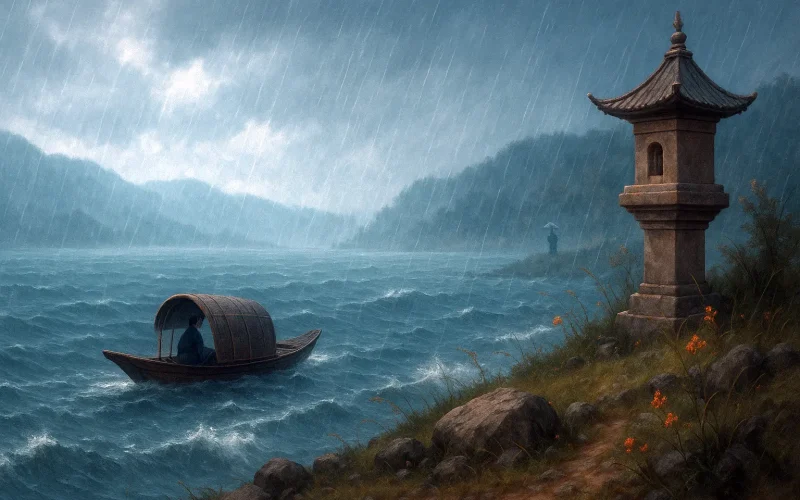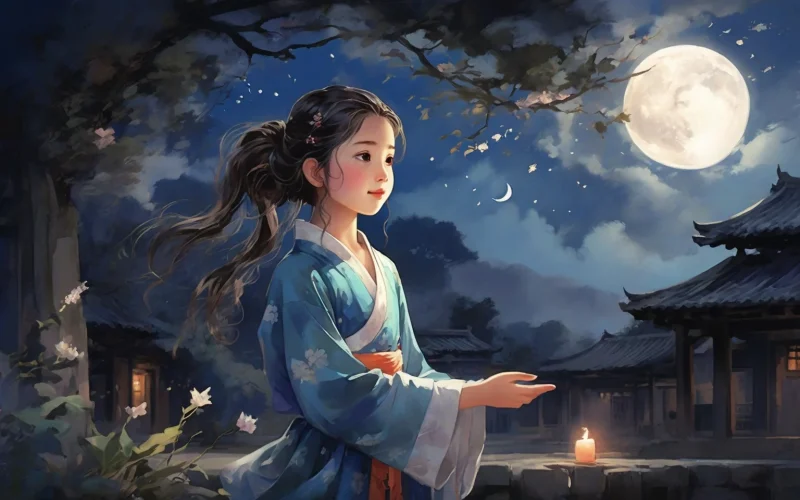Lonely, I feel more gloomy when I part with you;
Standing by riverside, we shed tears of adieu.
I am banished from home thousands of miles away;
Not dead for twelve long years, in the west land I stay.
Miasmic clouds darken the southern mountains high;
When spring ends on East lake, water blends with the sky.
From now on I would think of you and you of me;
I'd haunt in dreams our native land from tree to tree.
Original Poem
「别舍弟宗一」
柳宗元
零落残魂倍黯然,双垂别泪越江边。
一身去国六千里,万死投荒十二年。
桂岭瘴来云似墨,洞庭春尽水如天。
欲知此后相思梦,长在荆门郢树烟。
Interpretation
This poem was written in the spring or early summer of the 11th year of Yuanhe (816). At the time, Liu Zongyuan had been exiled to remote Liuzhou for 12 years following the failure of the Yongzhen Reformation. The poet's circumstances were bleak: estranged from his homeland, one brother had passed away, and another was far away. Isolated and burdened with sorrow, Liu Zongyuan composed this poem to express the pain of separation and the bitterness of exile.
First couplet:“零落残魂倍黯然,双垂别泪越江边。”
(Lonely and desolate, like a shattered soul, I feel even more heartbroken; tears stream down as we bid farewell on the shores of the Yue River.)
This couplet describes the poignant farewell between the brothers by the river. It captures the intertwining anguish of separation and solitude, emphasizing the poet's sorrow over his plight and the dispersal of his family.
Second couplet:“一身去国六千里,万死投荒十二年。”
(I left my homeland alone, journeying six thousand miles away; for twelve years, I have faced countless life-and-death tribulations in exile.)
Here, Liu recounts the hardships of his twelve years of banishment. Though written plainly, the couplet is infused with bitterness and injustice. Words like "万死" (countless deaths) and "投荒" (cast into the wilderness) vividly illustrate the poet's arduous life in exile, while subtly lamenting his unjust fate.
Third couplet:“桂岭瘴来云似墨,洞庭春尽水如天。”
(Clouds as dark as ink hang heavy with miasma over Gui Ridge; on Dongting Lake, the spring fades into a boundless expanse of water and sky.)
This couplet uses metaphor to contrast the brothers' respective destinations. The miasmic clouds over Gui Ridge symbolize the poet's oppressive circumstances, while the vast Dongting Lake suggests hope and opportunity for his brother. This juxtaposition of gloom and optimism conveys the sorrow of their separation and the uncertainty of reunion.
Fourth couplet:“欲知此后相思梦,长在荆门郢树烟。”
(If you wish to know what dreams of longing I will have, they will always linger in the hazy mists of Jingmen’s trees.)
This couplet uses the imagery of “郢树烟” (Jingmen’s tree mists) as a symbol of dreams and yearning. It conveys the poet’s enduring longing for his brother after their separation, blending emotion with a dreamlike sense of distance.
Holistic Appreciation
This poem intertwines the sorrow of parting from a brother with the pain of exile. Using familial bonds as its emotional thread, it reflects Liu Zongyuan's frustrations with his political fate. The opening couplet poignantly describes the farewell, while the second looks back on his exilic hardships. The third couplet employs contrasting imagery to convey separation, and the final lines evoke a dreamlike yearning for reunion. The poem’s heartfelt tone, vivid imagery, and seamless structure highlight Liu's literary prowess and emotional sincerity.
Artistic Merits
- Emotion and Scenery Interwoven: The poem uses natural imagery—such as the miasmic clouds and Dongting Lake—to mirror the poet's emotions, blending personal grief with environmental symbolism.
- Implicit Meaning in Diction: Without directly referencing classical allusions, terms like "万死" and "投荒" evoke a profound depth of feeling and historical resonance.
- Meticulous Structure: The poem features neatly paired couplets with balanced phrasing, combining narrative detail with emotional depth.
Insights
Through its profound emotion and lyrical beauty, this poem illustrates the anguish of separation and exile, urging readers to cherish familial bonds and confront adversity with resilience. Liu Zongyuan’s ability to elevate his personal struggles into universal sentiments of longing and sorrow allows readers to resonate with his experiences. Moreover, the interplay of despair and hope serves as a reminder to seek enduring connections and solace amidst life’s uncertainties.
Poem Translator
Xu Yuan-chong (许渊冲)
About the Poet

Liu Zongyuan (柳宗元, 773 - 819), a native of Yuncheng in Shanxi province, was a pioneering advocate of the Classical Prose Movement during China's Tang Dynasty. Awarded the prestigious jinshi degree in 793 during the Zhenyuan era, this distinguished scholar-official revolutionized Chinese literature with his groundbreaking essays. His prose works, remarkable for their incisive vigor and crystalline purity, established the canonical model for landscape travel writing that would influence generations. As a poet, Liu mastered a distinctive style of luminous clarity and solitary grandeur, securing his place among the legendary "Eight Great Masters of Tang-Song Prose" - an honor reflecting his enduring impact on Chinese literary history.












